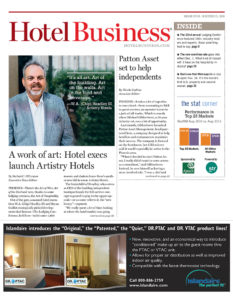The presidential election has been contentious, to say the least. While there are numerous issues on which Donald Trump and Hillary Clinton vastly disagree, there are several issues affecting the workplace on which they agree. Although there is no crystal ball to prepare us for what the future holds, by understanding these issues and preparing for potential changes ahead, the hospitality industry can lessen any adverse impact the election may have.
The imposition of paid maternity leave. An area where both candidates seem to agree is a federal requirement for paid maternity leave. Trump has commented that employers should be required to offer six weeks of paid maternity leave. Clinton, while adamantly supporting it, has not specified the extent of paid leave she believes to be appropriate. In any event, employers who do not currently offer paid maternity leave should analyze its impact on their workforce and take steps to prepare for the financial implications of providing it. However, employers must be careful not to create a potentially discriminatory environment by avoiding hiring women based on a desire to decrease the effect of any paid-leave requirement.
Immigration debate. The candidates have drastically different views on immigration and illegal immigrants in the workforce. Clinton has voiced that illegal immigrants who are currently employed should be granted temporary amnesty and provided a simple avenue for gaining citizenship. Trump has argued for a strict prohibition against illegal immigrants in the workforce and for their immediate deportation. Further, he has proposed rewriting the H1-B visa system and providing preference to American workers by raising the wages of foreign workers. Clinton has not mentioned H1-B visa reform. Under a Democratic president and Congress, there may be a larger influx of immigrants to the country—and, thus, the workforce—than there would be under a Republican president and Congress.
Healthcare reform and the Cadillac tax. Clinton intends to expand the Affordable Care Act (ACA) to ensure all Americans are insured. Trump has expressed a strong desire to repeal the ACA. However, Trump cannot repeal it without the support of Congress, and congressional elections and the resulting control of the House and Senate are never easy to predict. If Trump is elected, it is unlikely there will be any immediate changes to the ACA. However, if Clinton is elected, expansion of the ACA could occur relatively swiftly and will likely result in further human resources confusion, as the obligations under the ACA are already complicated. Employers should ensure that they are aware of the reporting requirements and other obligations, and that these obligations are being followed. Penalties for violating the ACA are severe.
Changes to anti-discrimination laws. Another area where the candidates do not agree is expanding anti-discrimination laws. There are many laws that prohibit discrimination and harassment based on age, sex, race, national orientation, disability and other protected characteristics. However, the debate as to whether protections should include gender identity and/or sexual orientation has become a hot topic.
Clinton has expressed her desire to expand anti-discrimination laws such that the protections against sex or gender discrimination and harassment will include gender identity and/or sexual orientation. Trump has clearly stated that sexual orientation and gender identity should not be considered protected. Notably, the Equal Employment Opportunity Commission (EEOC) has already begun training its investigators to identify sexual orientation and gender identity discrimination, and is determined to file suit on such claims while the publicity for such actions remains high.
Employers should take action to ensure employee handbooks, policies and procedures regarding discrimination, harassment, retaliation and equal opportunities in the workplace include protections for lesbian, gay, bisexual and transgendered individuals. Employers should also focus on training human resources officers and managerial employees on these new policies and how to respond to claims of discrimination and retaliation.
Classifying employees as exempt from overtime requirements. The new overtime regulations are scheduled to take effect Dec. 1, 2016. Currently, to classify an employee as salaried or overtime-exempt, under the white collar exemptions to the Fair Labor Standards Act, the employee must not only perform certain exempt job duties, but must receive an annual salary of at least $23,660. Under the new regulations, the minimum salary threshold more than doubles to $47,476. While Trump has expressed his displeasure with this, it is unlikely either candidate will have the ability to alter this in the near future.
However, during the next four years, the election could have a significant impact on an employer’s ability to classify a worker as salaried or overtime-exempt. While Trump will likely not be able to overturn the new regulations, his election could result in an expansion of the regulation’s definitions regarding what qualifies as an exempt job duty. By expanding the scope of exempt job duties, employers could more easily classify workers as exempt so long as they receive the requisite minimum salary.
Clinton has repeatedly stated her desire to increase the restrictions on overtime exemptions, and impose requirements to pay qualifying exempt employees overtime compensation at time and one-half their regular rate for some portion of overtime worked. Thus, a Democratic win could result in more employees currently classified as exempt—lower-level managers or the like in the hospitality industry—no longer qualifying for exemption.
Employers should immediately audit their workforce and identify employees who will no longer qualify as exempt. When addressing whether to increase a potentially impacted employee’s salary to meet the new minimum threshold for exemption, the employer should analyze the employee’s job duties to ensure that he or she will continue to qualify as exempt if a stricter job duties analysis is put into place. Employers should consult with legal professionals who specialize in such employment matters.
Minimum wage increases are imminent. In addition to the increasing salary requirements for exempt employees, increased minimum wage requirements seem inevitable, but the extent of the increase will likely depend on the candidate elected. Both candidates have expressed their support for raising the federal minimum wage. While Trump has wavered, stating that increasing minimum wage would be better left to the states, he has also stated his intent to increase minimum wage to $10/hour. Clinton has consistently expressed her intent to increase the federal minimum wage to $12-$15/hour.
Businesses, particularly those in states that do not have a state minimum wage requirement at or above $10/hour, should brace themselves for the potential impact of an increase to the federal minimum wage. Employers should evaluate the financial and logistical impact, especially in light of the new overtime regulations that will likely decrease the number of employees who qualify as salaried or overtime-exempt. By taking a proactive approach, employers in the hospitality industry can lessen the adverse impact of these changes.
Annette A. Idalski is a shareholder and chair, and Joan M. McCallum is an attorney, in the Labor and Employment practice at Chamberlain Hrdlicka in Atlanta.
Let us know what you think… To comment on this opinion piece, or to voice your own opinion about pertinent industry topics, please email Christina Trauthwein at [email protected]. We’d love to hear from you and share your point of view.



